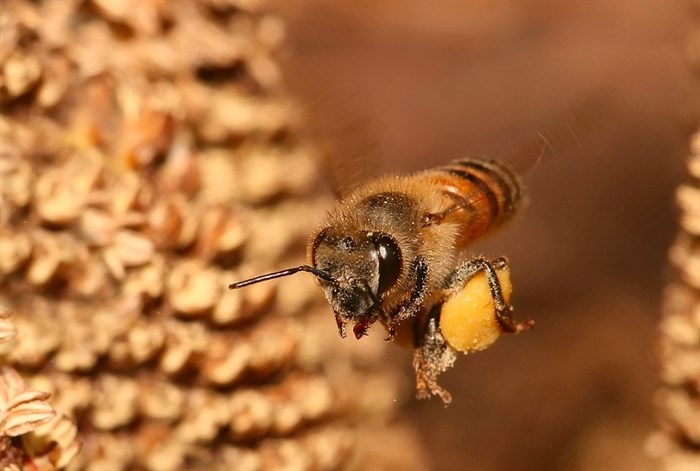
Image Credit: Wikipedia
November 13, 2015 - 9:00 PM
OKANAGAN - An abnormally hot and dry summer appears to have had an unwelcome impact on Okanagan honey production.
Helen Kennedy, who runs Arlo’s Honey Farm in Kelowna with her husband Rick Appel, says the season started off with an unusually early honey flow in May, likely due to above average spring temperatures. A productive summer looked promising, she says, until the bees "essentially stopped working."
“The only honey we got this year was the early flow,” Kennedy says.
Normally, Kennedy will get two pulls of honey between June and August, sometimes three in an especially good year. The consensus among several different honey farms in the Okanagan is that a prolonged period of hot, dry weather this summer resulted in a less productive year.
“Once the temperature reaches 29 Celsius the bees stop hauling nectar and start gathering water instead to cool their hives,” Kennedy says. “That’s their form of air conditioning.”
Another probable factor, Kennedy says, was the amount of smoke in the air from wildfires in the South Okanagan and in Washington.
“Technically what smoke does is it makes the bees gorge on the honey,” she says. “During the smoky times, the bees were staying in their hives and eating the honey.”
Aside from impacting the farm’s bottom line, lower honey production might also impact the bees in the long run, Kennedy says.
“The bees need 60 to 70 pounds of honey to get them through the winter. The warmer the winter, the more active the bees are and the more they eat,” she says.
With an El Nino winter coming and less honey stored up in the hives, Kennedy says it’s possible as many as 50 per cent of their bees might not make it. She and her husband stopped pulling honey completely at the end of August to let the bees stock up, and have also added supplements like pollen patties, but only time will tell if it’s enough, she says.
In Vernon, Planet Bee also reports a less productive season, and in Armstrong, Wild Mountain Honey and Bee Farm owner Dianne Wells says it was the first time in over 30 years of beekeeping she didn’t get a honey flow at all.
“There’s always a point where the honey comes in really quickly. It varies every year but I’ve never seen a summer where we didn’t get a week or two of really good honey coming in,” Wells says.
She says the overall yield was less than half of what they would normally get.
“I kept going out to put more boxes on thinking there would be more honey and there would only be a small amount. I kept thinking next week they’ll need (more bee boxes), and it never happened,” she says.
She stopped taking honey in mid-August and says the bees should have lots to get them through the winter.
“They just didn’t bring in any extras for the beekeepers,” she says.
Longtime Armstrong beekeeper John Gates also saw less honey production this summer. A former bee inspector for the Ministry of Agriculture, Gates cites a number of reasons for the smaller yields, including the hot, dry weather.
“There’s less moisture in the soil for plants to produce nectar, which is what the bees collect for honey,” he says. “Some areas still produced quite well, probably due to existing soil moisture.”
But another major impact, he says, is shifting agricultural practices. With the price of hay quite high this year, farmers were taking as many cuts of alfalfa as they could, Gates says.
“If the farmers are cutting it before it blooms, the bees don’t get the chance to produce honey from it,” he says. “Near my yards, there was virtually no bloom of alfalfa all year long due to the cuts.”
Another agricultural change he’s noticed since he started beekeeping 40 years ago is that dairy farmers are cutting hay for silage, instead of dry hay.
“If they don’t try to make it into dry hay, they can cut it before there’s blooms at all. Even in a year when hay prices aren’t high, they’re still cutting it as often as they can,” he says.
He’s also noticed that many alfalfa fields in the area are being replaced with corn.
“Bees don’t produce honey from corn,” he says.
Beyond the Okanagan, dwindling bee populations worldwide have been a rising concern in recent years. A record drought in California has greatly reduced honey supplies, and many farmers are also blaming the use of pesticides for massive bee deaths. The industry is also facing a phenomenon known as colony collapse disorder, in which worker bees suddenly disappear.
To contact the reporter for this story, email Charlotte Helston at chelston@infonews.ca or call 250-309-5230. To contact the editor, email mjones@infonews.ca or call 250-718-2724.
News from © iNFOnews, 2015